Contest conducted by Marc Smith
The 2025 annual competition moves into the second half with plenty of contenders jostling for places near the top of the leader-board. This looks like a fairly tough set on which to score highly, so perhaps we will see some gaps opening in that race.
The European Championships, held in Poznan, Poland, finished this month. A number of panelists were in action, and I am pleased to report that two members of the panel, Sjoert Brink (right) and Michal Klukowski, were gold medal winners in the Open Teams. That completed an impressive double for Sjoert, who also won the Mixed Teams earlier in the tournament. The panel also contains two more gold medalists from Poznan, Sophia and Cathy Baldysz, who won the Women’s Pairs having led almost throughout the competition. Congratulations to them all.

Three of this month’s problems have been sent to me: Hand 1 by panelist Barnet Shenkin, Hand 5 from David Jones and Hand 8 from Simon Mostyn. Thanks to them. If you have a hand that you think would make an interesting problem for the panel to discuss, please send me the details.
The panel offer support for just three choices on six of this month’s hands (and only four on the other two). They also produce a majority choice on six hands, and a clear favorite on the other two. There will not be many deals scoring 10-9-9-8 in this set. With marks more likely to be dropped in clumps, I suspect that high scores will be harder to come by than has been the case in recent months.
The most popular action chosen by the competition entrants scores maximum marks on four of the eight hands, and voting with the largest group of competitors this month scores 64/80 (the same as in June). The average score this month is 57.48 (up from 53.42 on Set 25-06). Let’s see what the panel have to say about this month’s hands…
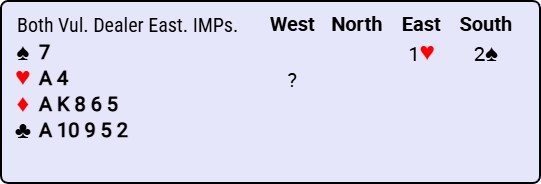
|
ACTION |
MARKS |
PANEL |
Competitors' |
|
Dbl |
10 |
13 |
49 |
|
3♦ |
7 |
6 |
32 |
|
3♣ |
7 |
3 |
6 |
|
3♠ |
2 |
0 |
6 |
|
4♥ |
2 |
0 |
1 |
|
2NT |
0 |
0 |
3 |
|
4♦ |
0 |
0 |
1 |
|
4NT |
0 |
0 |
1 |
Competition Entrant Average Score: 7.70
As with many of this month’s problems, the panel saw only three options, with one emerging as a clear favourite. Almost half of competitors agree with the panel choice, so many players are off to a good start. Many panelists saw no further than the ‘obvious’…
ALAN MOULD: Dbl. I'm lost - what else?
ANDREW ROBSON: Dbl. Why bid part of your hand, when you can bid all of it?
CATHY BALDYSZ: Dbl. This is the easiest panel hand I've ever bid. What’s the trap? 😊
JOEY SILVER: Dbl. With three potential places to play, I’ll ask partner’s opinion.
MIGUEL VILLAS-BOAS: Dbl. 3♦ raises the auction level, so double seems like the best way to start.
CHRISTIAN MARI: Dbl.
JILL MEYERS: Dbl. I would rather get both suits in now than bid diamonds and then clubs.
HANOI RONDON: Dbl. The double doesn't show my strength, but it will tell me where our minor-suit fit might be located.
SALLY BROCK: Dbl. It looks as if the auction is likely to get higher any minute. Spades might well be raised, and then I can bid 4NT or double again, as I see fit.
LIZ McGOWAN: Dbl. I hate doubling with 5-5, but we are too high to get both suits into the auction by bidding naturally. If LHO raises spades, I can try 4NT next time. If LHO doesn’t raise, partner will likely try 3NT, which I shall pass. 3♠ would be game-forcing but partner might construe it as a good raise and keep bidding hearts.
ROB BRADY: Dbl. With four strains in play, we want to keep the auction low to give our side as much room as possible to investigate. I'm not worried about a big pre-empt from North, given my quick tricks. If we have the auction to ourselves, a 3♠ cue on our next turn will leave us well placed to find the best contract.
SARTAJ HANS: Dbl. I like double because the follow-up plan is simple. I intend to force to slam over 3-minor, bid 3♠ over 2NT and bid 3♠/4♥ over 3♥. Directly bidding 3m runs a risk of a three-card raise, when we're suddenly caught in no-man's land.

Last word from the majority goes to the man who initiated it…
BARNET SHENKIN: Dbl. I actually held this hand at the table, and I thought that double was the most flexible choice. It’s a close call with 3♦.
A minority faction preferred a third option…
MARTY BERGEN: 3♣. I love economical bids.
PAUL MARSTON: 3♣. Giving partner as much room as possible.
SJOERT BRINK: 3♣. Great hand, and I know I would bid 3♣ (creating more space). With two five-card suits many players bid the highest (so 3♦), but bidding 3♦ here is so bad that I cannot find any argument for it. If three suits are still possible to play, double is the most flexible bid, and some people will choose that option. I do hope that 3♦ would get zero points, as it shows you don’t have a clue about bridge.
Why don’t you say what you really think, Sjoert? 😊
He does have a point, as it depends on what you plan to do if partner bids 3NT? If you are going to pass, might partner not have something like Axx/KQxxx/x/Kxxx? The odds in 3NT are not that much better than in 7♣.
There a few heavy hitters disagreeing with Sjoert’s assessment. Can they convince us?
ZIA MAHMOOD: 3♦. What’s the joke?
WENFEI WANG: 3♦. Natural and game-forcing.
LARRY COHEN: 3♦. One of the tamer problems in the history of this forum.
They all seem to think that their choice is routine.
PIERRE SCHMIDT & JOANNA ZOCHOWSKA: 3♦. As we play 3♦ as natural and game forcing (many nowadays play that only competitive), that seems a normal start.
DAVID BIRD: 3♦. Negative doubles do not often work well when you have two long suits. Bidding 3♦ will at least pick up a 5-3 diamond fit, and may allow us to introduce the clubs subsequently.
P-O SUNDELIN: 3♦.
On this hand from the Telscher (the Senior Camrose), Barnet started with a double and his partner jumped to 3NT. He raised to 4NT and partner bid 6NT. That was cold opposite AKx/KQxxx/QJx/Kx but, at the other table, West started with 3♦ and they got to the good 7♦.
It seems to me that 3♦ will work best if the target is a 5-3 diamond fit. Double will work best if partner has four-card support for either minor or we belong in a high heart contract. 3♣ seems best if we want to play slam (or grand slam) opposite something like ♣K-Q-x, and will also be fine if partner has four diamonds or six hearts.
Although the panel produce a majority vote, I wonder if we have really answered the question of which of the choices will work most often on this combination. I have a sneaking feeling that more might consider the merits of 3♣ next time a similar problem arises.
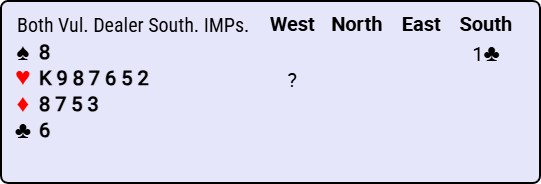
|
ACTION |
MARKS |
PANEL |
Competitors' |
|
3♥ |
10 |
11 |
32 |
|
2♥ |
8 |
7 |
31 |
|
Pass |
6 |
4 |
32 |
|
1♥ |
2 |
0 |
3 |
|
4♥ |
2 |
0 |
1 |
Competition Entrant Average Score: 67.68
No clear majority, but the overall view of the panel is for the most aggressive option, despite the vulnerability and poor quality of the suit. Perhaps what is more interesting is that almost a third of competition entrants agree (although it’s a close call for the competitors, who are split into three almost even groups). Let’s start with the most conservative panel members…
LIZ McGOWAN: Pass. Proudly displaying my “WIMP” badge.
WENFEI WANG: Pass. I don’t like to bid 2♥ or 3♥, vulnerable, with such a poor hand.
CATHY BALDYSZ: Pass.
Christian perhaps reveals his rubber bridge heritage…
CHRISTIAN MARI: Pass. I am not rich enough to bid 3♥.
Who would have expected to find the next two panelists in the same faction on this type of deal?
ZIA MAHMOOD: 2♥. I am too old to go higher.
DAVID BIRD: 2♥. Bidding 3♥ may cause more difficulty for the opponents, but I cannot justify it, when vulnerable with this flimsy suit. Partner might remember this hand, and not raise me, next time.
JILL MEYERS: 2♥. Vulnerable, I would rather have a better suit to jump to 3♥, although I do love my distribution.
P-O SUNDELIN: 2♥.
Ah… there is one relative youngster in this group…
MIGUEL VILLAS-BOAS: 2♥. 2♥ is enough with this hand.
BARNET SHENKIN: 2♥. If 2♥ is a weak jump, I’ll try that. My second choice is 1♥. I hope partner has sense of humour.
LARRY COHEN: 2♥. If white, I'd bid 3♥, but I'm chickening out here. Another tame one.
Surely Larry’s old mucker won’t also be in this group…
MARTY BERGEN: 3♥. "7-4, bid more." I assume most will bid less.
No. Marty is where you would expect to find him, although he will be surprised to find that he has so much company…
ALAN MOULD: 3♥. I don't mind 2♥, but I am sure there is some aphorism like “7-4, bid some more”, or something equally trite.
PAUL MARSTON: 3♥. I love 7-4-1-1s, but possibly not after this.
SARTAJ HANS: 3♥. The 7-4 shape compensates for the lack of suit texture.
ROB BRADY: 3♥. The extra shape suggests bidding more.
JOEY SILVER: 3♥. In the infamous words of Marty Bergen, “Vulnerability is for Children”.
Andrew earns ‘Comment of the Month’ honours for his astute observation.
ANDREW ROBSON: 3♥. I have a very high offense-to-defence ratio (okay, mainly because there is no defence).

SALLY BROCK: 3♥. I think everyone develops their own style for pre-empting. Mine is always to bid as high as possible. Good things seem to happen.
HANOI RONDON: 3♥. It's a seven-carder and 11 red cards in all. They're also vulnerable, I have to try.
Only Sjoert suggests that perhaps even 3♥ might not be enough!
SJOERT BRINK: 3♥. When the choices are 2♥/3♥/4♥, I usually choose 4♥. But, sometimes a little calm isn’t that bad. I bid 3♥ and will feel bad if the opponents then bid 3NT or 6♠, which would never have happened if I had followed my instincts.
We finish with some French pragmatism.
PIERRE SCHMIDT & JOANNA ZOCHOWSKA: 3♥. We are in. In this situation, statistically, N/S will hold 26+ HCP and we want to make their life a little bit difficult. If they score 1400, it's our life that will be a little bit difficult, but... that's life.
On this deal from the 2025 USBC, East held 10xxx/AQ10x/A/Axxx. At the tables where West passed, North played in 4♠ for E/W+100. At most of those where West overcalled in hearts, he played 5♥-doubled for +850. One pair did get to 6♥, but had to settle for +800 defending 6♠-X. A definite win for the bidders on this one!
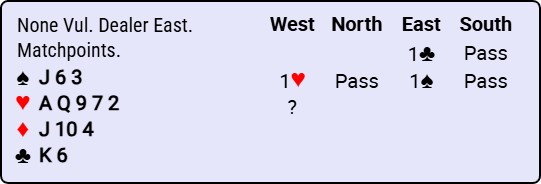
|
ACTION |
MARKS |
PANEL |
Competitors' |
|
1NT |
10 |
14 |
18 |
|
2NT |
7 |
5 |
28 |
|
2♦ |
5 |
3 |
30 |
|
2♠ |
2 |
0 |
4 |
|
2♣ |
2 |
0 |
3 |
|
2♥ |
0 |
0 |
10 |
|
3♥ |
0 |
0 |
2 |
|
3NT |
0 |
0 |
2 |
|
Pass |
0 |
0 |
1 |
|
3♠ |
0 |
0 |
1 |
Competition Entrant Average Score: 5.48
The choices are to underbid (1NT), to mildly overbid (2NT) or to overbid wildly (forcing to game with 2♦). With many of them citing the form of scoring, the panel voted significantly for the conservative action, whilst most competition entrants were split between the two more aggressive choices. Let’s hear what the panel has to say…
BARNET SHENKIN: 1NT. I hope for a plus score at matchpoints.
WENFEI WANG: 1NT. It’s matchpoints, so INT is enough.
SARTAJ HANS: 1NT. A soft underbid due to the form of scoring.
ANDREW ROBSON: 1NT. Standard problem - go low at matchpoints. I will be well placed if partner bids again.
LIZ McGOWAN: 1NT. Wimps like plus scores at matchpoints. Of course, we may have a better spot – if so partner might bid again…
SJOERT BRINK: 1NT. A plus score is a good score at pairs. Antonio Palma, who may be the best pairs player in the world, has one rule, “Calma di Palma!!” For normal people, that translates to “stay low”.
PAUL MARSTON: 1NT. Many possibilities, so I will go with the cheapest one.
P-O SUNDELIN: 1NT.
MIGUEL VILLAS-BOAS: 1NT. I really have too much, but I don’t like the other options.
HANOI RONDON: 1NT. A bit too strong, but tempered by the lack of a diamond stopper. Other bids would commit us too high.
JOEY SILVER: 1NT. With an awkward hand, and no clear direction at the inflection point in the auction, I’ll go conservative, letting the form of scoring protect me.
Another accurate prediction…
DAVID BIRD: 1NT. I predict a heavy reader vote for 2♦, but... The last time you want to overbid is when there's no likely fit and you have no stopper in the unbid suit. All bids here have a flaw, and at least 1NT will keep the bidding low.
LARRY COHEN: 1NT. A compromise on my strength, shape, and lack of a diamond stopper. It is flawed in so many ways that it might even turn out to be sensible. Seriously, we open so light white at matchpoints, that low is a good idea.

The French analyze the problem from the viewpoint of pairs who play XYZ here.
PIERRE SCHMIDT & JOANNA ZOCHOWSKA: 1NT. Yes, it's an underbid. But it's matchpoints. We play 2♦ game-forcing in this situation, with 2♣ as a puppet to 2♦ with invitational hands. The alternative (we would do it at IMPs) is to use 2♣, hear 2♦, and then make a choice between 2♥ and 2NT, both non-forcing.
The rest all go for something higher…
MARTY BERGEN: 2NT. It's a very imperfect world.
ZIA MAHMOOD: 2NT. What’s a diamond between friends?
CATHY BALDYSZ: 2NT.
ROB BRADY: 2NT. This looks invitational, and it is the only one we have available in our system. I'd prefer to be playing methods (say XYZ) where I could show my five-card major invite at 2M. For all the 1NT bidders (I know you're out there), does a 2♥ bid by opener now show extras or is it just an attempt to reach a better contract with 4315 shape? An important question for regular partnerships to discuss.
With a minimum 4-3-1-5, partner would raise to 2♥ rather than bidding 1♠. If he bids 2♥ over 1NT in this auction, he would therefore show extra values.
JILL MEYERS: 2NT. I have a balanced 11-count. I don't have a diamond stopper, but I still think 2NT is the best description.
And a small group go the whole hog and force to game…
CHRISTIAN MARI: 2♦. What is better?
SALLY BROCK: 2♦. Let’s go for the overbid.
ALAN MOULD: 2♦. The usual overbid, but the obvious 2NT alternative is likely to get the most likely game played the wrong way up.
Vulnerable at IMPs, perhaps something like 2♦ would be more attractive but, at MPs, the panel think the underbid is clearly best. At the table, partner had K8xx/Kx/Qx/A9xxx. Neither clubs nor hearts split 3-3, so +90 was the limit in NT, although you might make eight tricks (1♦/1♠/2♣/4♥) in a heart contract. However, with partner’s most likely shape either 4-1-3-5 or 4-1-2-6, angling to play in hearts is never really on the agenda.
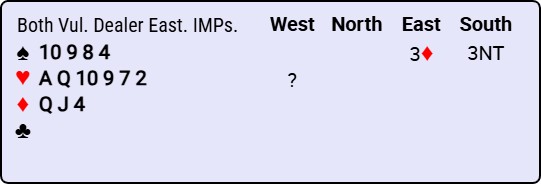
|
ACTION |
MARKS |
PANEL |
Competitors' |
|
5♦ |
10 |
13 |
22 |
|
4♦ |
7 |
7 |
47 |
|
Dbl |
7 |
0 |
8 |
|
4♥ |
5 |
1 |
12 |
|
Pass |
4 |
1 |
12 |
Competition Entrant Average Score: 7.13
Apart from a couple of mavericks, the panel saw this as a simple two-way choice: “How many diamonds should I bid?” More than two-thirds of competition entrants also opted for one of the top selections, but the split was the other way around. Let’s start with those who supported the competitors’ most popular choice…
MARTY BERGEN: 4♦. I hope I'm not underbidding.
SJOERT BRINK: 4♦. Guessing is not my thing and 4♦ looks normal. Don’t be the hero on every hand.
PIERRE SCHMIDT & JOANNA ZOCHOWSKA: 4♦. This seems enough for the time being. For sure South (and/or North) will find a second bid (Double? 4NT? 5♣?) and we will judge then.
CHRISTIAN MARI: 4♦. Waiting.....
WENFEI WANG: 4♦.
DAVID BIRD: 4♦. Let's see what happens next. I can decide whether to bid 5♦ next time if the opponents bid 5♣.
SARTAJ HANS: 4♦. 5♦ feels like too much with the ♦K offside. 4♥ could be right, but is a bit unilateral. 4♦ feels like down-the-middle choice and awaits further action.
The majority preferred not to ‘wait and see’…
MIGUEL VILLAS-BOAS: 5♦. On a lucky day +750. I don’t like to show my hearts and give space to the opponents.
JILL MEYERS: 5♦. They have a lot of clubs. Let them unravel it at this level. Plus, I think we could easily make 5♦.
JOEY SILVER: 5♦. I am always bidding 5♦ eventually, so why not right away? Let’s give the villains the final guess on what to bid or what to lead.
HANOI RONDON: 5♦. They might have nine tricks with their clubs. I'd love to show my hearts, but it's better to just take space and leave them guessing.
CATHY BALDYSZ: 5♦.
BARNET SHENKIN: 5♦. This has the advantage of reducing the opponents’ bidding space. The disadvantage is that 4♥ might be our best contract.
Some were less convinced…
ANDREW ROBSON: 5♦. I can’t lie, I’ve a bad feeling about this. Partner has a poor suit (only one of the top four diamonds), so he rates to be 7-4, quite possibly 2-0-7-4. Maybe they don’t make much…
ROB BRADY: 5♦. While it could be best to defend 3NT (I'd lead a heart), it's usually right to bid on if both sides could be making game. Here, I'd expect South to often make with long, running clubs. 4♥ could be the best game but, if partner doesn't have a fit, we could be going for a large number so I'll try to minimize the damage if I'm wrong. We might even pre-empt the opponents out of a black suit game if we're lucky.
PAUL MARSTON: 5♦. Who know? Clearly not me.
What about bidding our own suit?
ZIA MAHMOOD: 5♦. I considered 4♥, but decided that simpler is better.
LARRY COHEN: 5♦. My first instinct was to try 4♥ but, if that is making, then 5♦ is also likely to make. Picture, say, xx/xx/AK109xxx/xx.
That seems like an unlikely hand when South has shown a diamond stopper.
LIZ McGOWAN: 5♦. I am making lots of assumptions. Assuming South has a diamond stopper, my vulnerable partner has pre-empted on an Ace-empty suit, so she will have compensating distribution. If South leads a top club, partner might manage to scramble eleven tricks (dream on). I may miss an unlikely heart fit, but 4♥ will guide opponents to the best defence and does not shut out 5♣, over which I shall have to guess again.
Last word from the majority goes to someone who was there…
ALAN MOULD: 5♦. I know this hand. This could easily be a double game swing when South has a lot of clubs. I just think you bid 5♦. It’s at most one down (it was cold at the table) and gives them the problem.

There were just two solo fliers…
P-O SUNDELIN: 4♥.
SALLY BROCK: Pass. This could be wrong, but I am happy with where they are (I think).
This hand comes from the match between Ireland and England in the Teltscher (the Senior Camrose). The English West passed and collected +200. Partner had AJx/x/K109xxxx/xx. The Irish bid and made 5♦ at the other table (where South doubled the 3♦ opening rather than bidding 3NT), so that was 9 IMPs (or more) in the minus column for those not bidding 5♦. Well judged by the majority group on the panel, who flatten the board.
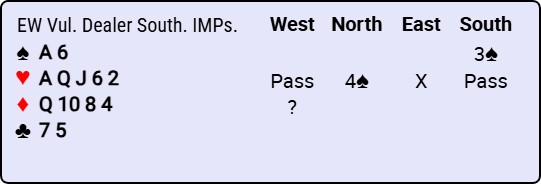
|
ACTION |
MARKS |
PANEL |
Competitors' |
|
5♠ |
10 |
4 |
6 |
|
5NT |
10 |
4 |
2 |
|
6♥ |
9 |
4 |
16 |
|
4NT |
8 |
10 |
11 |
|
5♥ |
6 |
0 |
42 |
|
Pass |
3 |
0 |
22 |
Competition Entrant Average Score: 6.37
This is a tough one to mark, as the single largest group of panelists opt for 4NT, most intending to make a slam try with 5♥ on their next turn. However, the majority of the panel, 12 out of 22, commit their side to slam, with some even looking at the possibility of a grand. As a result, everyone who chooses one of the options supported by the panel scores fairly well. However, the largest group of competitors (well over a third), simply compete to the five-level, and another significant portion choose to defend the opponents’ doubled game.
CHRISTIAN MARI: 4NT. I’ll bid 5♥ next to show a slam invite.
WENFEI WANG: 4NT. If partner bids 5♣, I will bid 5♥ to show a slam try.
PIERRE SCHMIDT & JOANNA ZOCHOWSKA: 4NT. When we bid 5♥ next, that will show a slam invitational hand, and that's what we have, no?
CATHY BALDYSZ: 4NT. I am planning to raise 5♦ to 6♦, and invite slam with 5♥ over 5♣.
ALAN MOULD: 4NT. 4NT then 5♥ when partner bids 5♣ - that ought to be a slam try in hearts. Sadly, it isn't if pard bids 5♦, but it’s the best I can do.
ZIA MAHMOOD: 4NT. I intend to follow with 5♥, or whatever shows a good 5♥ bid. If I can’t show an invitational heart bid, I would guess to bid 6♥.
A couple of panelists object to our pass on the previous round…
SJOERT BRINK: 4NT. A Pass of 3♠ is not my style, so I would like to abstain. Anyway, 4NT followed by 5♥ sounds for most people like a slam try. And, for sure I am worth it.
LIZ McGOWAN: 4NT. Two places to play. Over the expected 5♣ response, I’ll bid 5♥ and hope she can work it out. If the ♠A were in another suit, I would insist on slam. As it is, I do not want to punish partner for competing.
SARTAJ HANS: 4NT. Partner's double has to cover a lot of ground. It does not necessarily promise heart support. He could be 1-2-5-5 for example. Why should such a shape commit to the five level when we could have the had the same hand with ♠K-x and prefer to defend.
DAVID BIRD: 4NT. How can it be wrong to keep the bidding low? If partner responds 5♣, you can bid an invitational 5♥. On a sunny day, he may respond in diamonds.
David asks “How can it be wrong?” but most panelists think this hand is worth more than a slam try…
MARTY BERGEN: 5♠. I'm willing to force to slam.
HANOI RONDON: 5♠. I almost took action on my last turn, so I'll do something now in order to get to the best slam.
MIGUEL VILLAS-BOAS: 5♠. I could bid 4NT and then 5♥ to invite slam, but I think this hand is too good. I am looking for six, or even seven.
ANDREW ROBSON: 5♠. I must guess to bid a slam, and 5♠ may occasionally get us to seven (or, more likely, to collect the extra money from 7♠-doubled as opposed to 6♠-doubled).
What is the difference between 5♠ and 5NT? Does 5♠ should show first-round spade control and 5NT deny it? Alternatively, is 5NT just looking for the best small slam whilst 5♠ suggests interest in a grand? Plenty for regular partnerships to think about.
JOEY SILVER: 5NT. Pick a slam, partner, as long as it is not clubs.
LARRY COHEN: 5NT. Methods might be needed here, as it would be useful to be able to show a strong 5♥ bid. (The "expert" way is that a direct 5♥, as opposed to 4NT then 5♥, shows slam interest). But probably I am good enough to insist on slam -- and at IMPs, I am content to settle for 1370 instead of 1460 opposite, say, x/K10xx/AKJxx/Axx .
JILL MEYERS: 5NT. I don't know what level we belong at, but this is one reason pre-empts are so good. I hate to put cards in partner's hand to bid a slam, but it is entirely reasonable to play her for a stiff spade, the ♥K, the ♣A-K and at least one of the top diamonds.

ROB BRADY: 5NT. I'll follow up with 6♥ to invite the grand. Maybe I should just bid it outright. Partner should have a very strong hand for the double here, as they expect we will usually pass. Even something like --/Kxxx/AJxx/AQxxx gives us pretty good play for the grand, given the pre-empt on our right, but I'll take the low road and give partner some leeway.
Or, as Rob suggests, offering partner a choice and then insisting on hearts invites a grand.
Our final group simply bid what they think they can make.
BARNET SHENKIN: 6♥. Any finesses rate to work. The opponents also might save, so it’s worth taking the chance.
PAUL MARSTON: 6♥. I wish I had bid 4♥ the first time.
P-O SUNDELIN: 6♥.
SALLY BROCK: 6♥. I have the agreement these days that it is a slam try if I bid the highest suit immediately (rather than via 4NT) so maybe I should just bid 5H, but actually I fancy a slam anyway!
On this deal from the 2025 Spring Foursomes, partner held Qx/K10xx/AKxx/KQx. At the table, West tried 6♥, but had to lose a trick in each black suit. 4NT, 5NT or 5♠ may have been the winning option (depending on what you do next), as 6♦ makes easily. Bidding 5♥ would have flattened the board at +650, whilst passing the double brings in only +300.
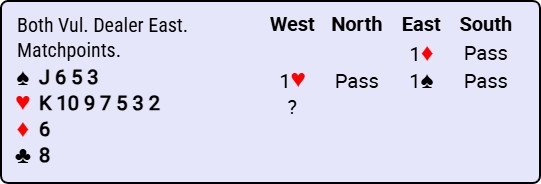
|
ACTION |
MARKS |
PANEL |
Competitors' |
|
2♥ |
10 |
12 |
16 |
|
2♠ |
7 |
7 |
49 |
|
Pass |
6 |
3 |
9 |
|
4♠ |
2 |
0 |
10 |
|
3♠ |
0 |
0 |
9 |
|
3♥ |
0 |
0 |
3 |
|
2♣ |
0 |
0 |
1 |
|
3♣ |
0 |
0 |
1 |
|
4♣ |
0 |
0 |
1 |
|
4♥ |
0 |
0 |
1 |
Competition Entrant Average Score: 5.77
The three obvious contenders all get some support from the panel, with just over half of competitors choosing the panel’s second-favorite option. The primary question is whether to support partner’s major or to rebid our own.
CHRISTIAN MARI: 2♥. A good bet?
MIGUEL VILLAS-BOAS: 2♥. I prefer to play in hearts.
MARTY BERGEN: 2♥. 7-card suits deserve to be trump.
ZIA MAHMOOD: 2♥. This is not a good hand for spades.
PAUL MARSTON: 2♥. Spades is unlikely to be better.
A number of panelists highlight the key reason for choosing to rebid our hearts.
LARRY COHEN: 2♥. With spades trump, I might take 0-1 heart trick. With hearts trump, I hope for at least five heart tricks.
DAVID BIRD: 2♥. Even if partner has no heart fit, his spades will boost my prospects in a heart contract. Playing in a 4-4 spade fit, my hearts could be near to useless.
PIERRE SCHMIDT & JOANNA ZOCHOWSKA: 2♥. Would our hearts make many tricks if we play a spade contract? Difficult to know, and our opponent's silence tends to suggest that our partner has a good hand. If we bid 2♠, we might end up too high.
LIZ McGOWAN: 2♥. This seems likely to be the best chance of a plus score. Guessing partner is 4144 or 4054 – the opponents have not bid clubs – so it’s hard to imagine that spades will play better than hearts on repeated trump leads.
SARTAJ HANS: 2♥. We will miss a few games but this is likely to matchpoint better than a spade partscore. I would have bid 3♥ at IMPs.
JOEY SILVER: 2♥. The value of this hand lays in the heart suit. It is rare that spades will play better, and often it will be significantly worse.
JILL MEYERS: 2♥. I am concerned that if I bid 2♠, we will get too high, so I am going to ignore that I have four spades.
Sjoert suggests an alternative strategy…
SJOERT BRINK: Pass. I would have bid 3♥ over 1♦, but now I have the chance to play at the one-level in an eight-card fit. Obviously, Calma di Palma!!
Jumping to 3♥ on the first round would not work well if the system says that is a splinter agreeing diamonds. Readers might like to check what their partner would make of such a jump.
WENFEI WANG: Pass. If possible, I would like to have bid 2♥ on the previous round.
Is this hand okay for a weak jump to 2♥, or does the seventh heart make it a bit too strong? Again, something for partnerships to agree upon.
CATHY BALDYSZ: Pass.
Some are prepared to raise spades.
BARNET SHENKIN: 2♠. Nothing is clear here. For me, it’s a toss-up between Pass and 2♠.
ALAN MOULD: 2♠. I hate denying four-card support, but I accept that this hand is likely to play better in hearts.
ANDREW ROBSON: 2♠. We are probably short of a ninth trump, and there is a case for rebidding 2♥. But, given the opposition’s silence, you’d back partner to hold around 3.5 clubs, so about half a heart.
P-O SUNDELIN: 2♠.
SALLY BROCK: 2♠. I know this might play a lot better in hearts, but that is too complicated for me. If I bid 2♥ and partner bids on, I am never going to persuade him that I have four spades.
Whilst most seem to be worried about getting too high, a couple support spades in the hope that partner can bid game…
HANOI RONDON: 2♠. I'll see if my partner wants to continue. My hand could be great with the right hand opposite.
ROB BRADY: 2♠. The lack of opposition bidding suggests either partner has a strong hand, or we have a misfit. It's often best for the weak hand to play in their long suit, to make sure they can take tricks, but it looks like this hand may play better in spades if partner has 4054 or 4153. A spade game is still in the picture if partner has something like/AKxx/x/AKQxxx/xx.
With many of the 2♠ bidders admitting that the hand will probably play better in hearts, I think the 2♥ bidders clearly win the debate. How did things work out at the table?
I switched the conditions to MPs as I thought it was a more interesting problem. This deal comes from the 2025 USBC Q-F, where all 8 West players heard a similar auction. Two rebid 2♥, 5 raised to 2♠, and one bid 4♠. Partner had Kxxx/A/10xxx/AJx. With trumps 3-2 and spades lying well (A-Q doubleton with North) 2♥ made an easy 10 tricks. 4♠ went 3 down. 2♠ also went down once, but the remaining declarers managed to make at least eight tricks. 2♥ works a bit better at IMPs, but at MPs it seems to be clearly best.
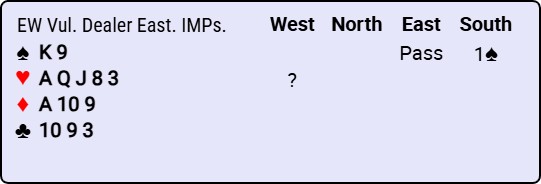
|
ACTION |
MARKS |
PANEL |
Competitors' |
|
2♥ |
10 |
15 |
81 |
|
Dbl |
7 |
6 |
13 |
|
Pass |
5 |
1 |
2 |
|
1NT |
3 |
0 |
2 |
Competition Entrant Average Score: 9.17
When this hand occurred at the table, the eight top-class West players were divided between four options: Pass, Double, 1NT and 2♥. Here, the competitors produce their largest vote of the year, with more than 4-in-5 agreeing with the panel’s majority choice. However, there were some strong views on the panel for various options…
WENFEI WANG: 2♥. It’s a normal overall.
PAUL MARSTON: 2♥. Getting the main feature of our hand on the table.
HANOI RONDON: 2♥. It's my five-card suit, and double won't show that.
ALAN MOULD: 2♥. Clear, IMHO. If they take me for 1400, so be it.
DAVID BIRD: 2♥. This is obvious, as I see it. You are not strong enough to double and then introduce the hearts. The semi-solid heart suit makes the decision even clearer.
Not all were quite so enthusiastic…
MARTY BERGEN: 2♥. Despite the 5332 shape.
MIGUEL VILLAS-BOAS: 2♥. It would be better with a sixth card, but it’s now or never.
P-O SUNDELIN/CATHY BALDYSZ: 2♥.
LIZ McGOWAN: 2♥. The least bad option. If the hearts were weaker, I would double.
Larry and Andrew make similar, pragmatic points in favour of their choice…
LARRY COHEN: 2♥. I am not strong enough to double and then bid hearts. 620 (in 4♥) is where the money is, but doubling would get us to 2♣ opposite something like xxxx/K10x/x/Axxxx.

ANDREW ROBSON: 2♥. Of course, I could be headed for -800. But, equally (or even more likely), partner could have some flat nine-count with 109x and 4♥ is cold.
Not everyone thought that double was the alternative.
BARNET SHENKIN: 2♥. The alternative for me is 1NT.
PIERRE SCHMIDT & JOANNA ZOCHOWSKA: 2♥. We will not blame our colleagues who prefer 1NT. Overcalling is, of course, a bit dangerous, but not overcalling is even more dangerous.
Sjoert has tribal reasons for his choice…
SJOERT BRINK: 2♥. Originally, I am from Rotterdam. This is called a “Rotterdam Overcall” (5332 and not enough high cards). People from Amsterdam call it bad bridge, but Rotterdam is in my heart. This will never change.
Joey was flying solo with…
JOEY SILVER: Pass. With East being a passed hand, the upside to bidding, vulnerable at the two-level with dodgy values, goes down. The downside will often show you that it is a dangerous world out there, to the tune of a phone number.
There was strength of feeling on the other side of the debate too…
ROB BRADY: Dbl. I can't bring myself to overcall 2♥ on such a flat hand with only five trumps. Maybe if partner was an unpassed hand, I'd be swayed, since then game would be more likely. We can still reach the heart game if partner has four of them, and doubling is the least likely action to result in our side being heavily penalized if partner is completely broke.
SALLY BROCK: Dbl. I’m too chicken for 2♥. Also, not enough playing strength.
JILL MEYERS: Dbl. I am not a fan of overcalling 2♥ on a five-card suit. I would rather make the more flexible bid of double, even though I am "heart heavy".
ZIA MAHMOOD: Dbl. I stopped biding 2♥ on this type of hand a few years ago.
Christian expects 2♥ to be the popular choice, but perhaps overestimates the weight of support for doubling…
CHRISTIAN MARI: Dbl. I will get 9 points and 2♥ 10 points.
SARTAJ HANS: Dbl. This is a matter of style. I prefer a 2♥ overcall on five cards only when we have compensating shape. This 5332 hand is closer to a pass than a 2♥ overcall. I don't like passing, when bidding is a viable option. Thus Double.
This deal arose in the QF of the 2025 USBC. Pass was generally followed by 3♠-P-4♠ (-420). Double fared worse, as it generally went 4♠-Dbl-All Pass (-590). Zach Grossack’s 1NT overcall also ended up -590 too, but a bit unluckily. This time, partner had xx/Kxxxx/Qxx/KJx, so 5♥ would have been only one down, but all of those who overcalled 2♥ ended up going plus defending 5♠-X.
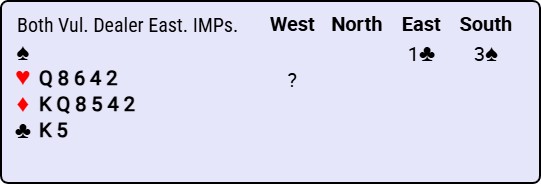
|
ACTION |
MARKS |
PANEL |
Competitors' |
|
Dbl |
10 |
16 |
66 |
|
4♦ |
6 |
5 |
22 |
|
Pass |
4 |
1 |
4 |
|
4♥ |
2 |
0 |
5 |
|
4♠ |
0 |
0 |
2 |
Competition Entrant Average Score: 8.18
We finish with a deal that produced the panel’s largest vote in a month of big majorities. With only two realistic options, more than two-thirds of competition entrants collected maximum marks. Rob’s prediction is not as far off as many have been,,,
ROB BRADY: Dbl. Please be unanimous.
WENFEI WANG: Dbl. It’s hard to see any other option.
CHRISTIAN MARI: Dbl. Too difficult for me.
SALLY BROCK: Dbl. And keep my fingers (and everything else) crossed. I can’t really see an alternative.
JILL MEYERS: Dbl. What am I supposed to do? I don't love double (I would not be happy if partner sat) but I am not bidding 4♥ and I don't like 4♦.
ALAN MOULD: Dbl. I have conceded 930 before. I really don't see what else I can do.
JOEY SILVER: Dbl. The trusting negative doubles seems to work for others but not me so, tell me, why am I still trying?
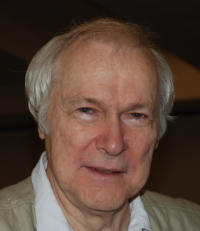
P-O SUNDELIN: Dbl. Very reluctantly, but all the alternatives are even less palatable.
HANOI RONDON: Dbl. I don't want to miss a fit in the major.
CATHY BALDYSZ: Dbl.
Miguel explains why he doesn’t like the principal alternative…
MIGUEL VILLAS-BOAS: Dbl. I don’t like to bid 4♦, as the right contract may be 3NT.
Whereas both Larry and David see this as a two-step process…
LARRY COHEN: Dbl. Hoping partner won't pass. If he bids 3NT, I am pulling to 4♦.
DAVID BIRD: Dbl. Doubling is unlikely to uncover an immediate red-suit fit - as is usual, after a negative double made on long suits. Here, though, you have a fair chance that partner will rebid 3NT or 4♣. Your 4♦ continuation will then paint a good picture.
Sartaj thinks it is the opponents who will give us a problem on the next round…
SARTAJ HANS: Dbl. When LHO raises, we will face the real problem. Perhaps 4NT then, with the idea of pulling 5♣ to 5♦, representing 6♦/5♥ (at least in my dreams).
Both our French Mixed champions and Sjoert tell us about their own methods, providing some interesting options for regular partnerships to discuss.
PIERRE SCHMIDT & JOANNA ZOCHOWSKA: Dbl. A tough one. We play transfers in this situation (4♣ for hearts, 4♦ for clubs, 4♥ for diamonds, 4♠ both minors) but we won't be able to show a natural long second suit. The true problem will be our next bid.
SJOERT BRINK: Dbl. With Bas, I play 4♣ shows ♦+♥, 4♦ shows only hearts, and 4♥ is ♥+♣. Without hearts, we try for 3NT, and usually double (or 4♠, super strong with one minor). This is highly recommended. But, to answer without agreements, double is most flexible.
Just a handful of panelists decided that they prefer something else…
PAUL MARSTON: 4♦. Not an easy ride.
BARNET SHENKIN: 4♦. Let’s wade into the deep water and hope something good happens.
ZIA MAHMOOD: 4♦. This is too tough. Bidding my longest suit is often a good idea, so I’ll try that.
ANDREW ROBSON: 4♦. We must prepare ourselves for the inevitable 4♠ from North. I think a 4♦ bid (then 4NT on the next round) leaves us best placed. Never forget, hearts has no meaningful advantage over diamonds when bidding over their spades.
MARTY BERGEN: 4♦. If, sensibly, using THRUMP doubles, I could bid 4♦ to show both red suits.
Liz is alone in deciding not to compete at this stage of the auction…
LIZ McGOWAN: Pass. The auction is not yet over… I can’t double with 6-5 and so little defence - partner might pass it out.
I won’t tell you partner’s hand, as it may appear as a problem sometime in the future.
With a score of 78/80, Brazilian star Miguel-Villas Boas leads the panel this month, giving him two solo victories and a shared win already this year. Close behind with 77/80 is our other South American panel member, Chile’s Hanoi Rondon. Completing an all-American podium are Larry Cohen and Joey Silver (both with 75/80). High scores seem to be at a premium on this set, with only half of the panel scoring in the 70s, so congratulations to all competition entrants to hit that target.

As usual, our thanks to all of our panel members for taking the time to entertain and educate our readers.
See you all again next month. Marc.
|
Miguel VILLAS-BOAS |
Dbl |
2♥ |
1NT |
5♦ |
5♠ |
2♥ |
2♥ |
Dbl |
78 |
|
Hanoi RONDON |
Dbl |
3♥ |
1NT |
5♦ |
5♠ |
2♠ |
2♥ |
Dbl |
77 |
|
Larry COHEN |
3♦ |
2♥ |
1NT |
5♦ |
5NT |
2♥ |
2♥ |
Dbl |
75 |
|
Joey SILVER |
Dbl |
3♥ |
1NT |
5♦ |
5NT |
2♥ |
Pass |
Dbl |
75 |
|
Andrew ROBSON |
Dbl |
3♥ |
1NT |
5♦ |
5♠ |
2♠ |
2♥ |
4♦ |
73 |
|
Sartaj HANS |
Dbl |
3♥ |
1NT |
4♦ |
4NT |
2♥ |
Dbl |
Dbl |
72 |
|
Jill MEYERS |
Dbl |
2♥ |
2NT |
5♦ |
5NT |
2♥ |
Dbl |
Dbl |
72 |
|
Paul MARSTON |
3♣ |
3♥ |
1NT |
5♦ |
6♥ |
2♥ |
2♥ |
4♦ |
72 |
|
Pierre SCHMIDT & Joanna ZOCHOWSKA |
3♦ |
3♥ |
1NT |
4♦ |
4NT |
2♥ |
2♥ |
Dbl |
72 |
|
Rob BRADY |
Dbl |
3♥ |
2NT |
5♦ |
5NT |
2♠ |
Dbl |
Dbl |
71 |
|
David BIRD |
3♦ |
2♥ |
1NT |
4♦ |
4NT |
2♥ |
2♥ |
Dbl |
70 |
|
Alan MOULD |
Dbl |
3♥ |
2♦ |
5♦ |
4NT |
2♠ |
2♥ |
Dbl |
70 |
|
Barnet SHENKIN |
Dbl |
2♥ |
1NT |
5♦ |
6♥ |
2♠ |
2♥ |
4♦ |
70 |
|
Sjoert BRINK |
3♣ |
3♥ |
1NT |
4♦ |
4NT |
Pass |
2♥ |
Dbl |
68 |
|
McGOWAN, Liz |
Dbl |
Pass |
1NT |
5♦ |
4NT |
2♥ |
2♥ |
Pass |
68 |
|
Cathy BALDYSZ |
Dbl |
Pass |
2NT |
5♦ |
4NT |
Pass |
2♥ |
Dbl |
67 |
|
Marty BERGEN |
3♣ |
3♥ |
2NT |
4♦ |
5♠ |
2♥ |
2♥ |
4♦ |
67 |
|
P-O SUNDELIN |
3♦ |
2♥ |
1NT |
4♥ |
6♥ |
2♠ |
2♥ |
Dbl |
66 |
|
Wenfei WANG |
3♦ |
Pass |
1NT |
4♦ |
4NT |
Pass |
2♥ |
Dbl |
64 |
|
Zia MAHMOOD |
3♦ |
2♥ |
2NT |
5♦ |
4NT |
2♥ |
Dbl |
4♦ |
63 |
|
Christian MARI |
Dbl |
Pass |
2♦ |
4♦ |
4NT |
2♥ |
Dbl |
Dbl |
63 |
|
Sally BROCK |
Dbl |
3♥ |
2♦ |
Pass |
6♥ |
2♠ |
Dbl |
Dbl |
62 |
|
|
|
|
|
|
|
|
|
|
|
|
TOP SCORE |
Dbl |
3♥ |
1NT |
5♦ |
5♠/5NT |
2♥ |
2♥ |
Dbl |
|
|
HAND 1: |
Dbl 10 |
3♣/3♦ 7 |
3♠/4♥ 2 |
|
|
|
HAND 2: |
3♥ 10 |
2♥ 8 |
Pass 6 |
1♥/4♥ 2 |
|
|
HAND 3: |
1NT 10 |
2NT 7 |
2♦ 5 |
2♣/2♠ 2 |
|
|
HAND 4: |
5♦ 10 |
4♦/Dbl 7 |
4♥ 5 |
Pass 4 |
|
|
HAND 5: |
5♠/5NT 10 |
6♥ 9 |
4NT 8 |
5♥ 6 |
Pass 3 |
|
HAND 6: |
2♥ 10 |
2♠ 7 |
Pass 6 |
4♠ 2 |
|
|
HAND 7: |
2♥ 10 |
Dbl 7 |
Pass 5 |
1NT 3 |
|
|
HAND 8: |
Dbl 10 |
4♦ 6 |
Pass 4 |
4♥ 2 |
|
|
HAND 1: |
7.70 |
|
HAND 2: |
7.68 |
|
HAND 3: |
5.48 |
|
HAND 4: |
7.13 |
|
HAND 5: |
6.37 |
|
HAND 6: |
5.77 |
|
HAND 7: |
9.17 |
|
HAND 8: |
8.18 |